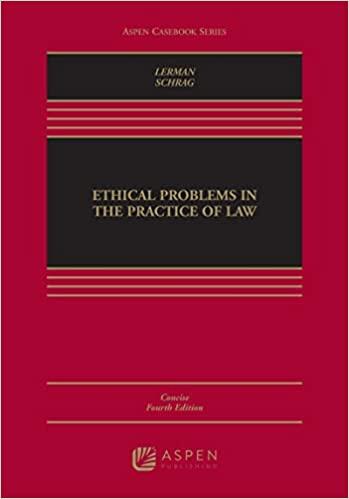Question
21.The Equal Credit Opportunity Act was enacted to prevent discrimination in credit extension. Which of the following is not prohibited by the act? a. Discrimination
21.The Equal Credit Opportunity Act was enacted to prevent discrimination in credit extension. Which of the following is not prohibited by the act?
a. Discrimination based on receipt of welfare.
b.Denial of a married woman's application to open a credit account separate from her husband's.
c.Asking whether the credit applicant is married.
d.Denial of credit based on lack of assets.
22. The Fair Debt Collection Practices Act prohibits a debt collector from calling a debtor at home more than three times regarding any one debt.
a.True
b.False
23.Under the Fair Debt Collection Practices Act a debt collector has the right to tell a consumer that if the validity of a debt is not disputed within 30 days, then it is presumed to be a valid debt. a.True
b.False
24. The Electronic Fund Transfer Act concerns liability limits for stolen ATM cards. Which statement is correct about maximum consumer liability:
a.$50 if the financial institution is notified within 2 days
b.$100 if the financial institution is notified within 3 business days
c.$250 if the financial institution is notified within 5 days O $400 if the financial institution is notified within 7 business days
d.none of the other choices
25.Which one of the following examples of corporate behavior would most clearly represent a violation of the Sherman Act?
a.A retailer offers quantity discounts to large institutional buyers.
b.The members of a labor union meet and agree not to work for a specific firm unless the starting wage is at least $10 per hour.
c. Two firms that are in different, unrelated industries merge
d.Two firms in the same industry agree in a telephone conversation to submit identical bids on a government contract
26.which one of the following is not exempted from federal antitrust regulation?
a. Labor Unions
b.Intrastate commerce
c.Telecommunications companies
d.Major League baseball
27. A firm that violates the antitrust laws could be required to break up into several independent companies.
a.True
b.False
28.Which of the following actions, if potentially anticompetitive, is least likely to be a violation of the antitrust laws?
a.The merger of a financially sound corporation with a competitor in a failing condition.
b.The acquisition of substantially all of the assets of a competing corporation.
c. The acquisition of a controlling stock interest in a directly competing corporation.
d.A horizontal merger of competing corporations.
29 . The primary purpose of the antitrust laws is to protect intrabrand competition (different retailers selling the same brand and competing on price and other sales factors).
a.True
b.False
30. A territorial restriction, such as Pepsi telling its bottlers where they can sell and deliver Pepsi, is per se illegal under the Clayton Act.
O True
O False
31. The Flick Corp. manufactured almost exclusively a gizmo that was sold throughout the United States. Flick required all purchasers to take at least two other Flick products to obtain the gizmo over which it has almost complete market control. As a result of this plan, gross sales of the other items increased by an amount that was a substantial portion of the total market for those items. Which of the following best describes the legality of the above situation?
a.It is illegal only if the products are patented products.
b. It is an illegal tying arrangement.
c. It is legal as long as the price charged to retailers for the other products is competitive.
d.It is legal if the retailers do not complain about purchasing the other products.
32. Illegal boycotts may involve manufacturers getting together to tell dealers what they must do and not selling to dealers who do not cooperate.
a.True
b.False
33. A seller who discriminates in price between different purchasers does not violate the Robinson-Patman Act unless the price discrimination substantially affects competition between the favored party and the disfavored party.
a.True
b.False
34. Only government agencies can sue for violations of environmental statutes.
a.True
b. False
35. People who live along rivers may use the river's water in a reasonable manner and are legally obliged by riparian law to pass the water along in usable form.
a.True
b.False
Step by Step Solution
There are 3 Steps involved in it
Step: 1

Get Instant Access to Expert-Tailored Solutions
See step-by-step solutions with expert insights and AI powered tools for academic success
Step: 2

Step: 3

Ace Your Homework with AI
Get the answers you need in no time with our AI-driven, step-by-step assistance
Get Started


